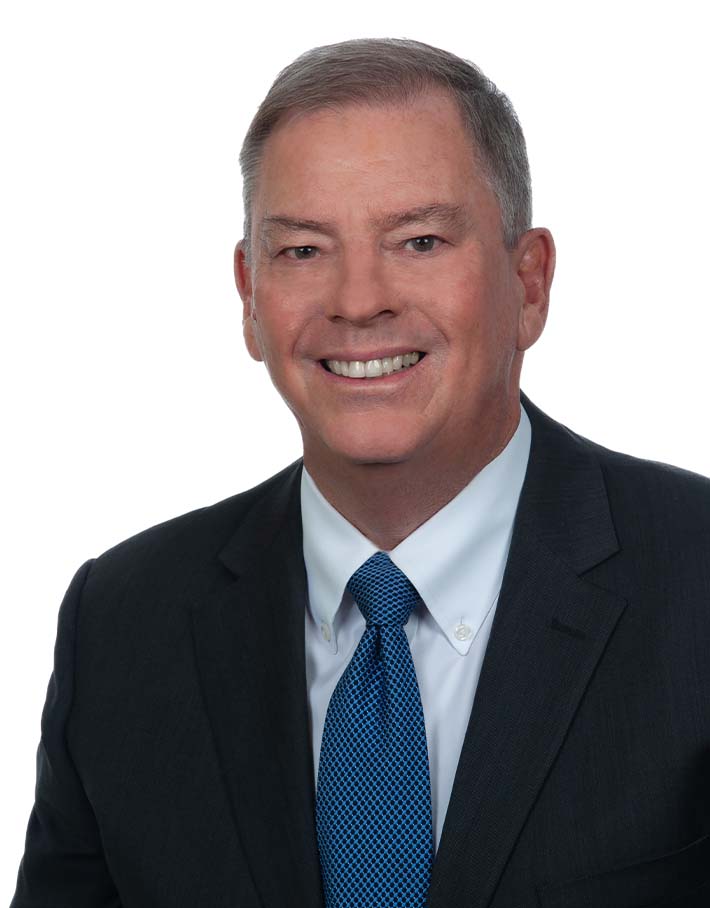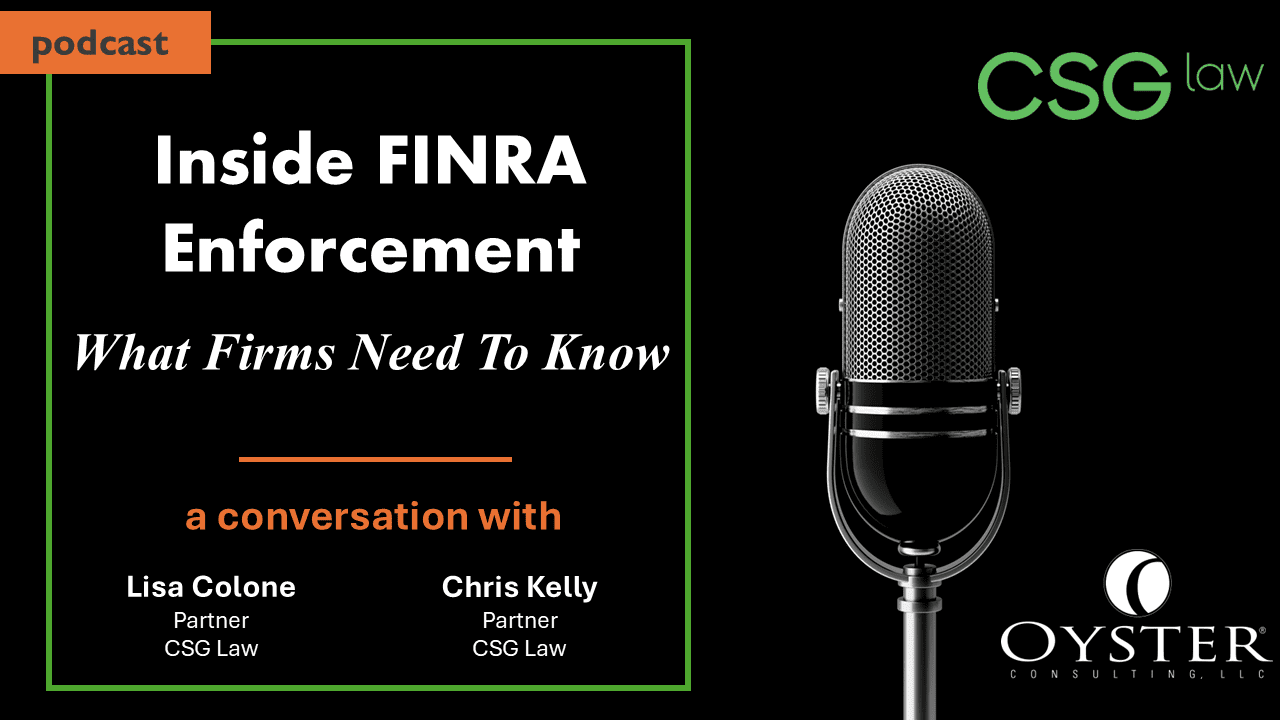Will There Be A Post-Pandemic Securities Litigation Wave?
By Patrick M. Dennis and Oyster Consulting LLC
Subscribe to our original industry insights
When markets are volatile, history has shown us that there is often an increase in securities litigation, In this week’s episode, Oyster’s General Counsel Patrick M. Dennis and Director Evan Rosser talk about past litigation trends in volatile markets and what they see coming as the pandemic continues to wreak havoc on the national economy and individual investments.
Oyster Consulting’s core team of former regulators, industry professionals and attorneys provide Expert Witness and Litigation Support Services. Because Oyster professionals come from a variety of backgrounds and are still involved as industry practitioners, their knowledge and expertise is valued by adjudicators, who rely on their experience and their ability to provide clarity on a range of complex matters. If we don’t have the right expert for your matter, we are happy to help you try to find the right person for your needs.
To learn more, read our recent blog “Increases Expected in Pandemic-Related Securities Litigation,” and listen to our podcast, Effective Expert Witnesses, or you can schedule a complimentary consultation by calling (804) 965-5400 or clicking here.
Transcript
Transcript provided by Temi transcript services
Oyster: Welcome to this week’s serving of Oyster Stew, a mix of financial services, commentary and insights. Each week we’ll discuss what is happening in the industry based on what we see as we work with regulators and clients. We hope you come away with the knowledge and tools to help you make the best decisions for your firm’s future. As we continue to produce our podcast from home without access to our recording studio, please be patient as we work to improve our recording quality.
Patrick M. Dennis: Hi, I’m Patrick Dennis. I’m the General Counsel and one of the founders of Oyster Consulting, and with me is Evan Rosser, a Director with Oyster Consulting. Both Evan and I do a fair amount of litigation consultant and expert witness work, and we thought today we would talk a little bit about what we think is coming as a result of the COVID-19 / Corona virus pandemic. We think there’s going to be an increase in arbitrations and customer complaints because of the market volatility and the market downturn. I think it’s pretty obvious from the height to the low of the Dow and the S&P. Both of those went down pretty much close to 30% from the high in late January or thereabouts to when this all started in March, and the lows that were coming. So, we certainly expect there’s going to be some fallout from that, and I think most other people do as well. Evan, what are your thoughts on this?
Evan Rosser: Oh, I agree, and I think there’s a lot of anecdotal evidence about the increase in complaints, but there are some statistics around it as well. Back in 2008 in that financial crisis, arbitration cases went up 53%, and they went up the next year in 2009, as well. The failure to supervise claims have a big jump back in 2008, 2009 on suitability margin calls. The big failure to have your trades executed in busy markets is a major customer complaint in arbitration. I think a lot of this, especially on issues such as alternative investments and ETFs, if you’re on the wrong side of the market in those products, you’re going to have some unhappy customers. And one thing to keep in mind, I think, is an increase in arbitrations will likely result in an increase in FINRA investigations. Arbitrations are really customer complaints, and FINRA will look at these and will investigate these. So, along with arbitration claims for a lot of firms, I think you’ll be seeing greater number of investigations from FINRA.
Patrick M. Dennis: Certainly you may, instead of just arbitration, you may see a pretty big uptick in customer complaints. A lot of times customer complaints precede arbitrations. Whether they have a lawyer or not, claimants or clients of broker-dealers and investment advisors will send in written customer complaints, and those will almost always result in a FINRA inquiry into the facts and circumstances, the response, what’s the firm doing, what happened, and all of those sorts of things. We’ve actually helped out with those things in the past as well, with various firms. One of the things that occurs to me, and while I certainly agree that we’re going to see an uptick in failure to supervise, we are certainly going to see a uptick in margin cases because, despite what all the literature and the disclosures say, clients are not required to get notice of the margin sellout and all of those things.
I’ve been involved in as an expert witness in a number of those cases, and it’s always something that’s hard for clients to understand, and even harder for panels to understand – that one of the aspects of margin is that you’re not required to give the client notice when you sell it out, and they’ve agreed to all that, and all the client and margin agreements. But one of the things that I recall, and certainly I hate to say how far back this is, but in the 1987 crash, I was about two years in at the SEC at that time and remember the market volatility and the huge correction and everything else. But the biggest problem that I remember is folks having a very difficult time communicating with their broker, investment advisor, just not getting returned phone calls, not being able to get through, not being able to place orders, not being able talk to their registered rep about the market, about their situation.
And that was always a big challenge. Then it was the same thing during the tech rack in 2000 / 2001, the same thing in 2008, 2009. You always heard these stories about clients that were unable to get hold of their broker. And so, I
would encourage any firm in the midst of all this, ignoring your client is not going to make it get better. It’s not going to make it go away. You need to communicate. You need to put in the long hours to make sure you return those phone calls and return those emails, text messages, however your clients are trying to communicate with you. I would strongly recommend you do that because every time I’ve seen this in my career that’s now 35+ years, the lack of communication or the inability to get hold of a broker or registered rep or investment advisor and discuss the problems has always been a huge issue.
So I would strongly urge folks to do whatever they need to do to make sure that they’re still communicating with their clients. You know, the other thing that’s somewhat interesting is we’ve seen a pretty big shift in 2008 to at least 2017, or even now probably more so, of the number of firms that are investment advisors as opposed to commission accounts. In 2008, that was about a year after the FCPA v. SEC suit that eliminated the fee in lieu of commission as part of the brokerage account and required them to be an investment advisory account. Shortly after that, it was about 26% of the accounts were considered to be investment advisory, rather than a brokerage. In 2017 it was 45%. At this point, I’m sure it’s probably over 50% of the client accounts that are actually with an investment advisor as opposed to a broker or a dual registrar on the investment advisory side. I think we’re going to see a lot of cases that are going to come out of that, not only instead of suitability, but breach of fiduciary duty is the standard of course for the investment advisor. We’re going to see a lot of cases out of that, but we’re also going to see cases in the investment advisor’s duty to monitor and duty to keep track of the client’s assets, and all those things, and monitor the accounts. That’s going to be a huge issue coming up. Your thoughts Evan?
Evan Rosser: Oh, absolutely. I think on the broker-dealer side, I don’t think any product or investment is going to be immune, but I agree with you. On the advisory side or on the fee-based brokerage side, there are going to be a lot of complaints about monitoring accounts. “You got me out too late. You got me back into soon.” Whatever it is, those claims are going to be fiduciary based. Claims are going to be, I think, a lot more prevalent than they were in the last crash when the market performed so poorly. As I said, the broker-dealer side is going to be very product-based. “This product performed poorly or was not suitable for me.” So I think you’ll see a lot of those going forward.
In some of the work I’ve done, and I know you’ve done this as well, Patrick, I’ve been a consulting expert in helping firms understand the FINRA process. Now, in the arbitration process, that’s not quite the issue. But on the enforcement side, knowing how FINRA and formerly NASD put together their cases, it’s very helpful for firms and their Counsel to have someone who can walk through the books and records, understands FINRA examination procedures, can help with trading analysis, suitability questions, reviewing exhibits and helping prepare exhibits. So I’ve done a lot of that, and I think that’s equally important on the arbitration side as well as the enforcement side. I think the one question going forward that is going to become particularly important in this area, after June 30th, is Reg BI and Form CRS, and it’s probably helpful that that was not in effect during the period of the first quarter of this year. But going forward, it is going to be an important issue because every arbitration claim, every customer complaint is going to begin with the review of that Form CRS; and for broker-dealers, the Reg BI disclosures. That’s where you’re going to demonstrate your Best Interest determinations. That’s where you’re going to demonstrate that you’ve disclosed the conflicts, you’ve disclosed your compensation. So going forward, I would imagine those disclosures, they’re going to be Item 1 to be requested in any arbitration or customer complaint.
Patrick M. Dennis: I agree. I think it was interesting – I saw an article today that the second circuit court of appeals has agreed to expedite its hearing of the lawsuit against Reg BI, or against the implementation of Reg BI, and is expected to hear oral arguments in early June and could come up with a decision at just about the time this is going to be implemented. So whether or not that goes forward as expected, obviously you have to plan on it, and you can’t hope that the Court of Appeals will save you. You’re going to have to be writing for Reg BI and your disclosures on your Form CRS. But it’ll be interesting to see how that comes out. But I agree. I think that’s going to be one of the first things we’re going to see. And I think Reg BI – not only is the disclosure of all the duties and obligations you have under that – I also think it’s going to be the Best Interest of the client in terms of various investments that you put this client in. It’s going to be a challenge, I think.
I’ve always thought that that Reg BI may create some real challenges for firms to both document everything they’ve done and everything they recommended, but also to clearly keep track of the investments that they recommended, why they did it and the alternatives that they could have recommended at the same time. Because claimants lawyers for sure are going to look for and find alternative investments that could have been recommended, and obviously may have performed better in those things. So I think that’s going to be a challenge in its own right. Throwing in the issue of the COVID-19 challenges and market volatility, it’s just going to make it even more challenging and difficult, is my thought. I think the other area we may see a lot of arbitrations and actions is in the fixed income and municipal securities.
A lot of the municipal securities that are out there may have some challenges with the delayed taxes, the delayed interest and all of those sorts of things. I don’t think we’re going to see a catastrophe like we did on the Puerto Rican bonds, but I think we are going to see some municipalities that are going to struggle to make their payments and make their interest payments, and all of those things, because of the decreased tax revenues from all the businesses that are sitting idle right now. So that’ll be interesting to see whether that’s going to be an issue, but I expect it might be.
Evan Rosser: Well, Reg BI is certainly going to put a burden on a firm to demonstrate how they make their Best Interest determinations more than ever. They’re going to need to have procedures that demonstrate how they get to that best interest determination, and that is going to be a challenge. It’s clearly going to be very challenging for firms to do that, to have procedures that can demonstrate that firms need to also be very sensitive to products that they’re offering on their platform that overcharge and under-perform. There are going to be products that firms need to look at very carefully. When they don’t perform and customers are dissatisfied, they are going to look at those costs. They’re going to look at procedures at the firm and it’s going to be important that you have that buttoned up and you’re sensitive to that.
Patrick M. Dennis: I think you’re right, Evan. I think you’re going to see a lot greater scrutiny on fees and fee sensitivity by clients and, frankly, the Claimant’s Bar as to the investments that folks are getting, in the fees that are getting charged, and relative to performance in general. So I think all of those issues are going to be on the table and they’re going to be something that we’re going to be hearing about for a while. We all know that there’s a little bit of a lag between the market volatility and the market downturn, and folks looking at their statements, again, figuring out what their losses have been. Well in closing, Evan, thank you for your time and your thoughts. I think it’ll be interesting to see how this develops and what occurs here. The industry is going to be impacted by all of this and the market volatility and downturn that that occurred.
But the good news is those of us that hung on to our investments and didn’t panic and didn’t sell, usually ended up doing pretty well. So in any event, if we can at Oyster do anything to help in terms of litigation support or expert witness, please keep us in mind. We’d love to talk to you. And even if you don’t think we’re got the right folks, give us a call, because we might know the right people to at least recommend and help you out. Feel free to look at our website www.oysterllc.com . Thanks for your time.
Evan Rosser: Thank you.
Oyster: Thanks again for listening to the Oyster stew podcast. Don’t forget to subscribe so we can continue to bring you resources to help you make the best decisions for your firm. If you’re struggling with a topic and you’d like us to do a podcast on it, or you’d like a free consultation, feel free to reach out to us at (804) 965-5400 or by visiting our website at www.oysterllc.com.



